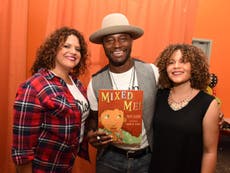Forgive me if I'm not nostalgic for an era when I was considered subhuman, Oxford University
I’m sorry to be a downer, but if I was a student at Oxford, the idea of dressing up in a suit, sporting a jheri curl and possibly donning white gloves doesn’t put me in the right mood for a jolly

The University of Oxford is currently embroiled in a race row over two colleges’ plans to hold end-of-year parties themed around New Orleans and the 1920s. So, is it right that students are criticising the theme, or is it that old chestnut ‘PC gone mad’?
Holding a Great Gatsby or a New-Orleans-in-the-1920s party isn’t an intrinsically racist act. But it does fairly insensitively ask people to attend a good old knees-up for a supposedly beloved and bygone era where women and ethnic minorities were regarded something as second-hand citizens (to put it mildly).
I’m sorry to be a downer, but if I was a student at Oxford, the idea of dressing up in a suit, sporting a jheri curl and possibly donning white gloves doesn’t put me in the right mood for a jolly. Strangely enough, I find it hard to have fun while being reminded of an era where I was considered subhuman.
Yes, I know I am not a slave and enjoy the right to vote, own land, access free education and generally enjoy other privileges that black people who lived in 1920s New Orleans could not. And yes, I am very aware that in 2015 New Orleans the levels of rank inequality between its black and white citizens are so disconcerting that it should perhaps put this debate into proper perspective.
But here’s the rub. If I’m a black student at any of the Oxford colleges, I am very much in the minority. In throwing at Great Gatsby party, not only are you completely missing the point of the damn book, but in doing in such a mono-ethnic space such as Oxford University, you run the risk of unintentionally recreating the racial picture of the 1920s. And that’s without even going into the racial possibilities of who might be likely to be serving drinks at a party for Oxford University students.
In 2015, ethnic minority students find themselves constantly marginalised and ‘other’ed, with very little consideration for our own voices being heard. When minority students created the “I too am Oxford” Tumblr page last year to highlight microaggressions, someone set up a “We are all Oxford” page in a misguided #AllLivesMatter response. This problem isn’t just limited to Oxford, but spreads to a number of higher education intuitions around the country – and indeed the world.
In failing to listen to the thoughts and opinions of our ethnic minority students, we do them a disservice, and then have the nerve to admonish them for being thin-skinned or playing the race card when they rightly point out something that something which never occurred to white organisers may be cause for offence.
In the few hours that have passed since tweeting about the story, I have been subject to racist abuse, various ad hominem attacks, and asked for my thoughts on dressing up in togas, Viking dress and other outfits of former conquests. It’s a bizarre quirk of privilege that derails valid protest from mariginalised voices and flips the onus onto the disenfranchised to ‘prove’ that racism ever happened.
And it has to stop. When a student suggests that it might be a good idea to have a campus safe space, because Yik Yak is flooded with a barrage of anonymous abusive messages masquerading as “banter”, we have to listen to them instead of decrying it as the molly-coddling of youth. But this is no “Young people today are too soft and complain too much” glib headline. This is “We have been failing marginalised voices for decades and only now are we beginning to realise the depth of their disenfranchisement. Maybe it’s time to do something about that.”
I can only hope some of remedy can be built going forward. If those in power can bring themselves to actually listen to students’ concerns, and respond to them with action, then it gives those students who look like me a fighting chance of coming away from institutions like Oxford University with far better memories of higher education than myself.



Join our commenting forum
Join thought-provoking conversations, follow other Independent readers and see their replies